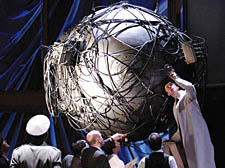|
|
 |
| |
| |
Dr Atomic, or: How I learned to stop listening and leave the room
REVIEW - DOCTOR ATOMIC
ENO COLISEUM
LOS Alamos, Jornada del Muerto, June 1945. At a laboratory in the southern New Mexico desert a team of American physicists are hard at work on the Manhattan Project, which is now just weeks away from the Trinity Test – the first shot of the military’s terrifying new “gadget”, the atomic bomb.
It’s easy to see why composer John Adams was attracted to the story of Robert Oppenheimer, the “father of the atomic bomb”. Oppenheimer and his team oversaw the creation of a weapon that could end all creation, and at a time when the world was tearing itself apart in a war of unprecedented magnitude, the idea that the bomb would set fire to the atmosphere and trigger the doom of mankind was being seriously, if quietly, entertained.
As an operatic muse, Oppenheimer’s story has all the drama and tension a composer could dream of. Sadly, unlike the weapon being developed, this opera completely misfires.
From the bizarre and clunky libretto to the minimalist score that sounds like the work of Philip Glass on a quart of absinthe, consumed while listening to Bernard Hermann’s Psycho theme, Doctor Atomic limps from scene to scene with all the impact of a child’s pop gun. It’s all short, sharp, screeching notes from the strings, discordant bursts from the wind and the odd belch thrown in by a percussion section that sounds thoroughly lost in a confused and irritating composition.
And as for the libretto, lines like “the 32 points are the centres of the 20 triangular faces of the icosahedron interwoven with the 12 pentagonal faces of a dodecahedron” are somewhat lacking in poetry and passion, to say the least.
Throw in a mish-mash of quotes from the Bhagavad Gita, songs of the Tewa, the Holy Sonnets of John Donne, and the poetry of Muriel Rukeyser, and the whole thing quickly becomes utterly unwieldy and bewildering.
Of course, the principle behind the music and libretto is clear – it is intended to create a sense of mounting tension in a detached scientific world – but while the score is technically accomplished it has no bearing on the singing. The orchestra and the singers sound about as far removed from each other as we are today from the Manhattan Project – which, if you do your sums, is 64 years, give or take a few months.
A story such as this, with all its cultural relevance and historical import, should have the audience gripped. Instead, I found my mind wandering to other times when the story, image and aftermath of the atomic bomb has been explored with far greater effect: in Stanley Kubrick’s Dr Strangelove, where the madness of nuclear war is definitively described and the simple musical refrain of “When Johnny Comes Marching Home Again” creates more tension than three hours of Adams’s minimalist naval gazing; in Andy Warhol’s doom-laden Atomic Bomb silk screens; in the photographs of Hiromi Tsuchida, whose simple portraits of Hiroshima survivors speak volumes of the suffering endured; and in Cormac McCarthy’s novel
The Road, with its harrowing imagery of nuclear holocaust and a devastated world, “a thing which could not be put back. Not be made right again”.
On the night I attended, Gerald Finley was laid low by a chest infection, but I doubt even the great baritone’s presence could have lifted this awful production.
The biggest problem with Doctor Atomic is the confused state in which it finds itself. As a play, the writing would never make it past a first draught; as a musical, it would be laughed off the stage; and, worst of all, as an opera, it is so bad that it edges dangerously close to being a send-up of the genre itself.
The closing words of the libretto find Oppenheimer in reflective mood. The “shot” is now only two minutes away, and the doctor observes: “Lord, these affairs are hard on the heart.”
I couldn’t agree more.
|
 |
|
 |
|
|
 |
|








